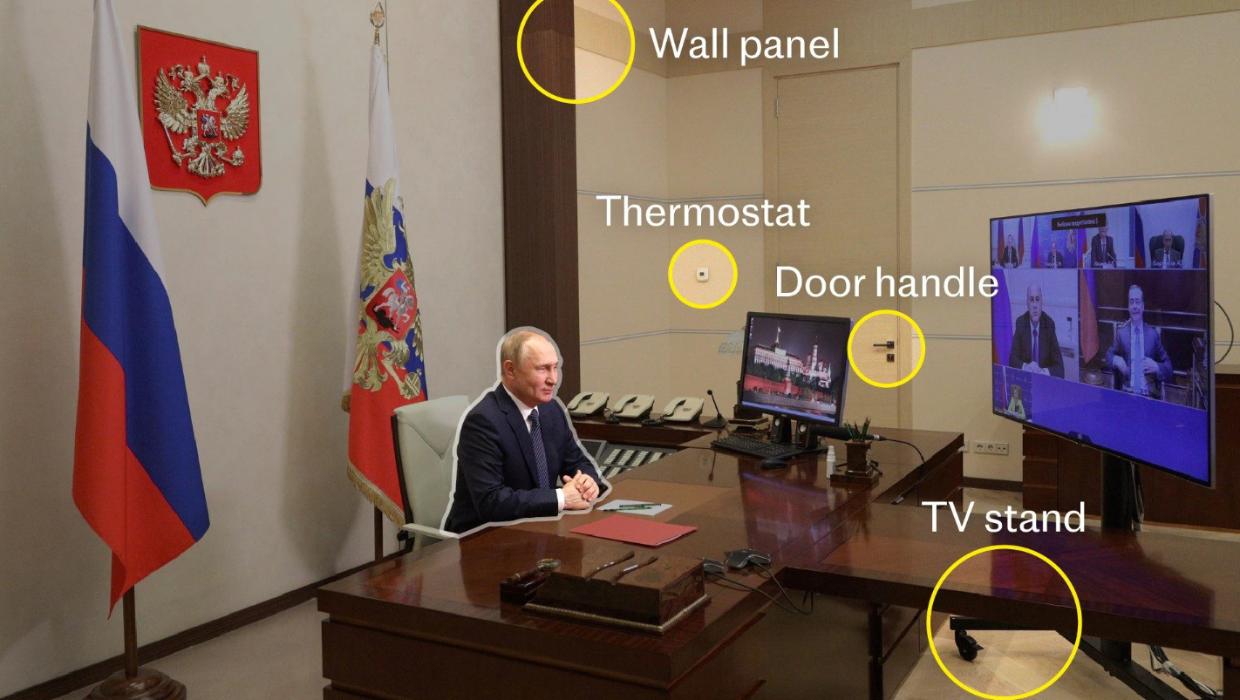Politics
Investigation Reveals Putin’s Use of Replica Offices to Hide Location

An investigation has unveiled that Vladimir Putin employs exact replicas of his offices in various regions of Russia to obscure his true location and mitigate the risk of potential attacks. This strategic deception aims to enhance his security and maintain a façade of normalcy, particularly during critical engagements.
According to a report by the investigative platform Proekt, the replicas are designed to mirror the original offices, complete with identical furnishings and layouts. This practice not only confounds potential attackers but also serves to bolster the psychological warfare aspect of his leadership. The Kremlin has been known to implement extensive measures to ensure the safety of its leaders, and these replicas represent a significant evolution in those protective strategies.
Strategic Implications of Office Replicas
The investigation highlights that the replicas are strategically placed in locations across the country, including Moscow, St. Petersburg, and several other regions, allowing Putin to travel without revealing his actual destination. The findings suggest that this method could be a response to increasing security threats, particularly from foreign adversaries.
Russian security services, such as the FSB, have long been tasked with ensuring the safety of governmental figures. The use of office replicas appears to be a calculated move to enhance these efforts. In recent months, tensions with various nations, particularly those in the West, have heightened concerns regarding Putin’s safety.
This tactic aligns with broader national security measures reportedly discussed within the National Security Council. The council’s strategy emphasizes the need for enhanced protection protocols, especially after incidents that have put the Kremlin on high alert.
Reactions and Context
Responses to this revelation have varied, with experts weighing in on the implications of such security measures. Some analysts argue that creating replicas could indicate a higher level of paranoia within Putin’s circle, suggesting a fear of targeted attacks. Others view it as a sophisticated form of statecraft designed to project strength while concealing vulnerability.
While the Kremlin has not publicly acknowledged the existence of these replicas, the investigation’s findings add to a growing narrative about the lengths to which Putin will go to secure his position. Understanding these tactics provides insight into the broader implications for international relations and security in the region.
As geopolitical dynamics continue to evolve, the revelations regarding Putin’s office replicas serve as a reminder of the intricate relationship between power, security, and perception. The implications of these findings extend beyond Russia, affecting how other nations might approach their own security protocols in an increasingly volatile global environment.
-

 World4 months ago
World4 months agoTest Your Knowledge: Take the Herald’s Afternoon Quiz Today
-

 Sports4 months ago
Sports4 months agoPM Faces Backlash from Fans During Netball Trophy Ceremony
-

 Lifestyle4 months ago
Lifestyle4 months agoDunedin Designers Win Top Award at Hokonui Fashion Event
-

 Sports4 months ago
Sports4 months agoLiam Lawson Launches New Era for Racing Bulls with Strong Start
-

 Lifestyle4 months ago
Lifestyle4 months agoDisney Fan Reveals Dress Code Tips for Park Visitors
-

 Health4 months ago
Health4 months agoWalking Faster Offers Major Health Benefits for Older Adults
-

 World4 months ago
World4 months agoCoalition Forms to Preserve Māori Wards in Hawke’s Bay
-

 Entertainment4 months ago
Entertainment4 months agoExperience the Excitement of ‘Chief of War’ in Oʻahu
-

 Politics4 months ago
Politics4 months agoScots Rally with Humor and Music to Protest Trump’s Visit
-

 Top Stories4 months ago
Top Stories4 months agoUK and India Finalize Trade Deal to Boost Economic Ties
-

 World4 months ago
World4 months agoHuntly Begins Water Pipe Flushing to Resolve Brown Water Issue
-

 Science4 months ago
Science4 months agoNew Interactive Map Reveals Wairarapa Valley’s Geological Secrets









